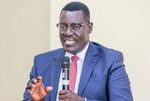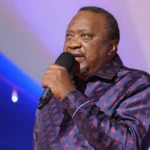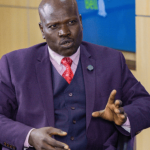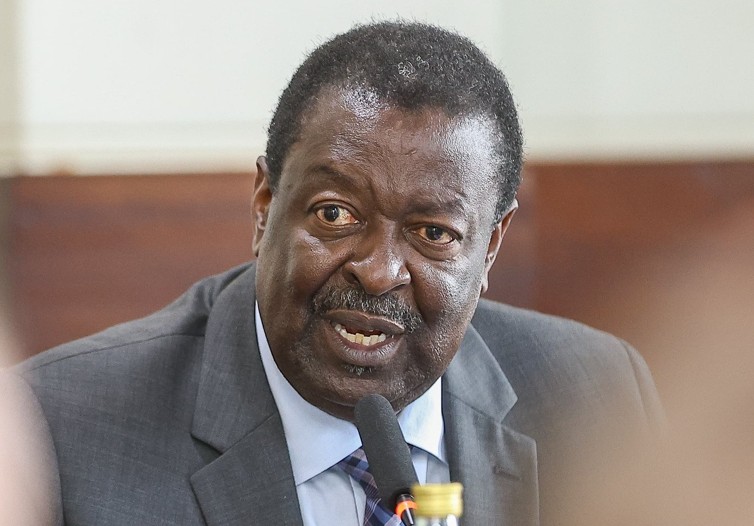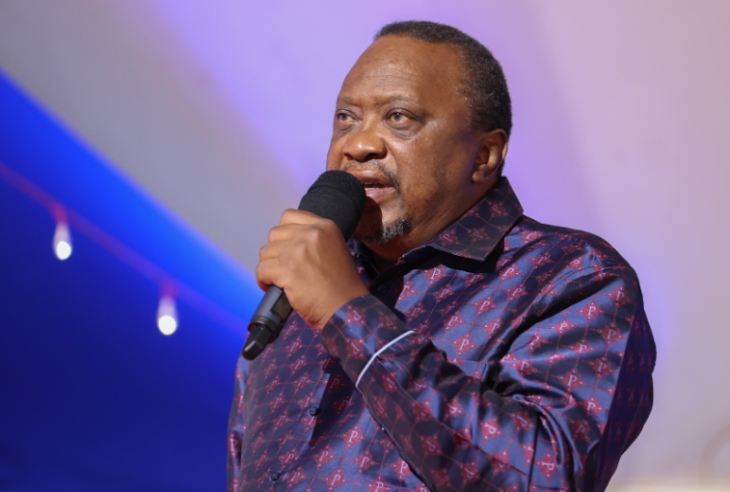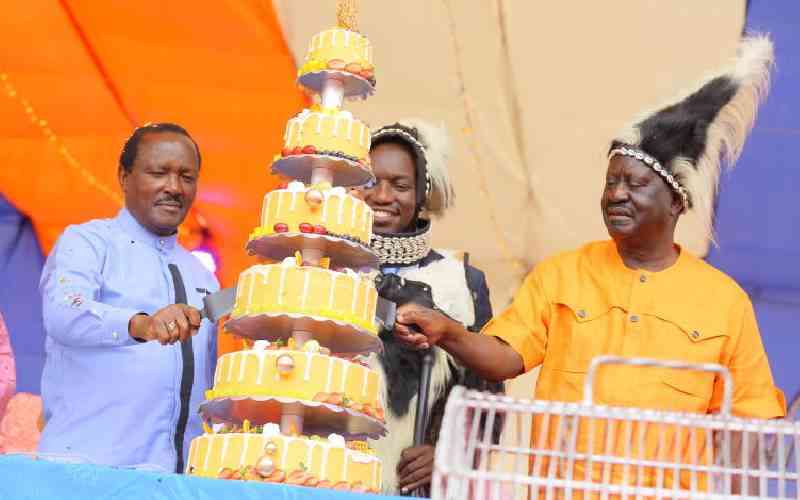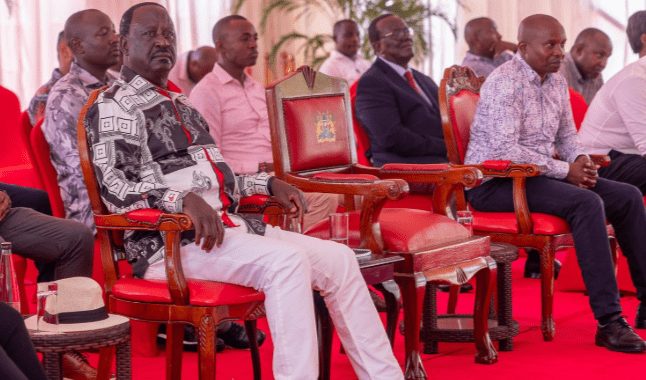Prime Cabinet Secretary Musalia Mudavadi has hailed Kenya as a heritage of peace in the region and in Africa as a whole.
In a statement on Monday, February 24, 2025, Mudavadi, who also serves as the Cabinet Secretary for Foreign and Diaspora Affairs, defended the recent move by the government to allow the formation of a Unity Government by Sudanese political parties, civil society, and military groups in the Nairobi, terming it a step in the road to restoring peace in Sudan.
“The Government would like to affirm that the Nairobi peace talks are just but part of the Kenyan DNA of problem-solving in the region, and in the continent since its independence,” Mudavadi stated.
“From the leadership of the Founding father of the Nation the late Mzee Jomo Kenyatta, to the second President the late Mzee Daniel Toroitich Arap Moi, the late Mzee Mwai Kibaki, President Uhuru Kenyatta, and now HE President William Ruto, Kenya which has been an oasis of peace, has never shied away from offering a helping hand, to its warring neighbours in the region, the continent of Africa and across the globe.”
According to Mudavadi, all presidents of Kenya have put the country’s foreign policy on mediation and peace-making on a high pedestal, and have utilized their presidency to position themselves as champions of the pan-African agenda of peace and security.
“Under President Ruto, Kenya remains steadfast in championing Peace in trouble-stricken countries including the current and worrying conflicts in Sudan and the Democratic Republic of Congo (DRC),” he added.
This comes a couple of months after Kenya’s Foreign Policy 2024 was unveiled in December 2024, and the Foreign Policy Sessional Paper which was tabled in Parliament with a focus on placing the country in active peace-building efforts and mediating regional conflicts.
Angola’s independence
Mudavadi cited Mzee Jomo Kenyatta’s role leading up to Angola’s independence in November 1975, which he says has been widely acclaimed and is among the first confident steps in the push for peace across Africa.
“Three Angolan liberation movement leaders Jonas M. Savimbi, Dr. Agostinho Neto, and Holden Roberto of the National Union for the Total Independence of Angola (UNITA); the Popular Movement for the Liberation of Angola (MPLA), and the National Front for the Liberation of Angola (FNLA) respectively came to Mombasa for negotiations. They later met in Nakuru on June 21, 1975, where they signed a deal that led to Angola’s independence in November of the same year,” Mudavadi stated.
He also highlighted several peace initiatives by retired president the late Daniel Moi such as the 1989 peace negotiations in Mozambique, giving refuge to deposed Somali President Mohammed Siad Barre in 1991, 1996 peace talks involving Ali Mahdi, Hussein Aideed, and Osman Atto in Nairobi, Machakos Protocol of July 2002 which ended the second Sudan war and the South Sudan peace talks.
“In the 1980s, President Moi condemned the invasion of Lesotho by the apartheid regime of South Africa signifying his active role in peace. In late 2002, President Moi hosted a Somali national reconciliation conference in the Kenyan town of Eldoret. The conference took place under the auspices of the Intergovernmental Authority on Development,” Mudavadi added.
Mudavadi also hailed efforts under Mwai Kibaki to lead the Somalia National Reconciliation Conference (Eldoret/ Mbagathi) under the auspices of IGAD in Mbagathi Nairobi and Eldoret.
The efforts led to the birth of a Transitional Federal Charter and a Transitional Federal Parliament, which chose Abdullahi Yusuf as the president in October 2004 for a five-year transitional period.
“The Kenyan peace process involved a mixture of political and military leaders, traditional elders, and civil society leaders but was dominated by faction leaders. Kenya also facilitated the signing of the Comprehensive Peace Agreement known as the Naivasha Agreement on 9th January 2005, by the Sudan People’s Liberation Movement (SPLM) and the Government of Sudan which conclusively ended the war and developed democratic governance countrywide and a framework for the sharing of share oil revenues,” he added.
During President Uhuru Kenyatta’s reign, Kenya hosted three conclaves of the Heads of State of the East African Community (EAC) on April 8, 2022, April 21, 2022, and June 20, 2022, all in Nairobi that led to the Nairobi process, aimed at finding a lasting solution to the conflicts in Eastern Democratic Republic of Congo (DRC).
Kenya became a troop-contributing country to the United Nations Stabilization Mission in the Democratic Republic of Congo (MONUSCO)
Mudavadi says the government is actively involved in the facilitation of the ongoing High-Level Mediation for South Sudan (HLMSS) popularly known as the Tumaini Peace Initiative together with President Salva Kiir of South Sudan.
Launched on May 9, 2024, in Nairobi, the initiative brings together the South Sudan Government of National Unity (RTGoNU) and the holdout groups that have not signed the 2018 Revitalized Agreement on Resolution of the Conflict in South Sudan (R-ARCSS). Lt-Gen Lazarus Sumbeiywo former Kenyan Army Commander is the Chief Mediator.
Mudavadi says the government is also playing an active role in bringing peace to the DRC and also leading the Multinational Security Support (MSS) Mission in Haiti, with hundreds of troops deployed.
He says that the government is leading the peace initiative for Sudan by allowing warring groups to hold talks at the Kenyatta International Conference Centre (KICC) that on Sunday, February 24, 2025, led to the signing of a peace agreement deal.
Since independence, Kenya has had 43 peace missions across the world such as Sierra Leone, Somalia, Liberia, Haiti, Lebanon, South Sudan, Central African Republic, DRC, Yugoslavia, Croatia, Cambodia, Iran-Iraq Military Observer Group (UNIIMOG), East Timor, and Western Sahara.
Francis Muli
Francis Muli is a passionate digital journalist with over seven years of experience in crafting compelling stories across various platforms. His major focus is in business, politics and current affairs. He brings a keen eye for detail and a commitment to uncovering the truth.
He has contributed to leading publications across the country.
When not chasing stories, you can find Muli exploring new technologies, attending local events, or reading fiction.
Connect with Francis Muli on X @FMuliKE and Facebook (Francis Muli) to follow his latest stories and insights.
